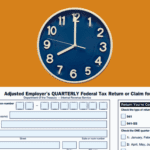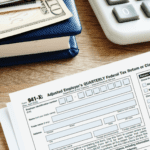If you are like so many other Americans, filing taxes and meeting all deadlines can be a major source of stress. For months leading up to each tax season, the burden of gathering financial documents, navigating complex tax laws and ensuring accurate filings can feel overwhelming. The fear of missing deadlines only adds an additional layer of anxiety. Whether due to busy schedules, unforeseen circumstances, or simply an oversight, realizing a missed tax deadline can be distressing.
However, it is essential for you as a taxpayer to recognize that you are not alone in facing these challenges, and there are several viable solutions and options available to address late filings and minimize potential repercussions.
Assess Your Situation
Accurately and thoroughly assessing your situation when you are late filing your taxes is critical to understanding the scope of the issue and determining the best course of action. It is essential to first confirm whether you have indeed missed the tax deadline and identify any potential consequences associated with the late filing.
Next, gathering all relevant tax documents and financial records can help you paint a more comprehensive picture of your financial situation, and enable you to accurately assess the income, expenses, and deductions applicable to your tax return. Understanding the reasons behind the oversight, whether due to personal circumstances, business complexities, or other factors, provides insights into how to avoid similar issues in the future and implement better tax planning practices.
Once you have evaluated your situation, you can then make more informed decisions about how to proceed. This might include determining whether you can file a late tax return or if you need to request an extension from the IRS.
Assessing your situation also involves understanding the potential penalties and interest associated with late filings, so you can take the necessary steps to address them. Seeking professional help, such as consulting a tax professional or tax resolution attorney, can be beneficial during this assessment process. Their expertise can guide you through the complex tax landscape, identify applicable deductions and credits, and explore potential options for penalty abatement. In situations where a tax liability has been taken on. an accurate and thorough assessment of your late filing situation empowers you to take control of your tax obligations, minimize financial stress, and find a resolution that best suits your circumstances.
Gather All Necessary Documentation
The first step in filing any taxes, but especially in filing your taxes after the deadline has passed is to put together all documentation to support your tax claims. When gathering documentation to support a late tax filing, it is crucial to be thorough and organized. You should start by collecting W-2 and 1099 forms from employers and other sources of income. Ensure that you have any additional documentation related to self-employment income, such as invoices, receipts, and business expense records.
If you have made charitable contributions, obtain receipts or acknowledgment letters from the organizations. Do not forget to include any investment-related documents, such as 1099-B forms for capital gains and losses. You should also make sure to gather records of any deductible expenses, such as medical expenses, education expenses, or property taxes.
Once you have all the necessary documentation, you should carefully review each item to ensure accuracy and completeness. Double-check that the information matches your financial records and make corrections as needed. If you are missing any essential documents, take immediate steps to obtain replacements or contact the appropriate institutions for assistance.
Staying proactive and meticulous in your document gathering will not only facilitate the late filing process but also improve your chances of claiming all eligible deductions and credits, ultimately reducing your tax liability. If you encounter any uncertainties or complexities during this process, seeking the guidance of a tax professional can provide peace of mind and ensure that your late tax filing is accurate, comprehensive, and in compliance with tax regulations.
File Your Late Return
Filing a late tax return requires careful attention to detail and adherence to specific procedures. First, you need to gather all relevant financial documents, including income statements, W-2s, 1099s, and other forms necessary to report your income and deductions accurately. Next, choose the appropriate tax form based on your business structure (e.g., Form 1040 for individuals, Form 1065 for partnerships, and Form 1120 for corporations). Prepare your tax return using the most current tax year’s forms and instructions, ensuring you include all income sources and applicable deductions. If you owe taxes, it’s crucial to calculate the interest and penalties for the late filing, as they will apply until the tax liability is paid.
When it is time to submit your late tax return to the IRS by mail with the appropriate postage or electronically if e-filing is still available for the tax year in question. While filing late can incur penalties and interest, addressing the situation promptly and accurately can help mitigate potential consequences and bring you back into compliance with tax regulations. If you encounter challenges or complexities during the process, seeking assistance from a tax professional or tax resolution attorney can provide valuable guidance and ensure that your late tax return is filed correctly and efficiently.
Request an Extension
Requesting an extension for filing your taxes can be a helpful solution if you need more time to gather all the necessary financial documents and information. To request an extension, you must submit Form 4868, Application for Automatic Extension of Time to File U.S. Individual Income Tax Return, by the original tax filing deadline. This extension typically grants you an additional six months, moving the deadline from April 15 to October 15. It’s important to note that an extension only applies to the filing deadline, not the payment deadline. If you anticipate owing taxes, you must still estimate and pay any tax liability by the original due date to avoid penalties and interest on late payments. Filing for an extension provides peace of mind and allows you more time to complete your tax return accurately, reducing the risk of errors or omissions that could lead to audits or penalties.
When requesting an extension, it’s essential to provide a reasonable explanation for needing additional time to file your taxes. The IRS grants automatic extensions for those who can demonstrate a legitimate need, such as personal hardships, business disruptions, or other unforeseen circumstances. Keep in mind that filing for an extension does not exempt you from paying any taxes owed; it merely grants more time to complete the tax return filing process. If you require assistance in preparing the necessary paperwork or estimating your tax liability, consulting with a tax professional or tax resolution attorney can ensure that your extension request is filed correctly and that you meet all necessary tax obligations in a timely manner.
Pay Penalties, Fees, and Interest Accrued
Paying penalties, fees, and interest accrued on late taxes is an essential step in resolving your tax obligations. When you file taxes after the deadline or fail to pay taxes owed by the original due date, the IRS typically imposes penalties and interest on the unpaid amount. These penalties can vary and may include late filing penalties, late payment penalties, and interest charges on the outstanding tax balance.
Ignoring these penalties and interest can lead to compounding debt and a more significant financial burden over time. To address these additional costs, it’s crucial to promptly settle any outstanding tax liability, penalties, and interest accrued. Taking action to pay these amounts demonstrates good faith in fulfilling your tax responsibilities and can help prevent further escalations, such as tax liens or levies. If you are unable to pay the full amount immediately, consider setting up an IRS installment plan or exploring other payment options to resolve your tax debt gradually. Seeking assistance from a tax professional or tax resolution attorney can provide valuable insights and negotiation support to ensure that you address the penalties, fees, and interest efficiently and work towards regaining financial stability.
Seek Professional Guidance
Seeking professional guidance when facing the consequences of filing taxes after the deadline is crucial for navigating the complexities of the tax system and finding the best resolution for your situation. Tax laws and regulations can be intricate, and the consequences of late filing can lead to significant penalties, interest charges, and potential legal issues.
A tax resolution attorney has in-depth knowledge and experience in dealing with the IRS, allowing them to provide personalized advice and guidance tailored to your specific circumstances. They can help you understand your rights, options, and obligations, and assist in negotiating with the IRS to potentially reduce or waive penalties. A tax resolution attorney can also help you explore payment plans, installment agreements, or other tax relief programs to resolve your tax debt in a manageable manner.
Having expert assistance not only eases the stress of dealing with the IRS but also ensures that you take the most appropriate steps to address your late filing situation effectively and regain control of your financial standing.
The Law Office of Steven Klitzner
If you or a loved one have found yourself in a sticky situation with the IRS due to failure to file your tax returns on time, don’t stress about it. Instead, let Steven Klitzner, South Florida’s premier tax resolution attorney, handle it. Klitzner is highly trained with decades of experience and a proven track record against the sharks at the IRS.
Klitzner knows how to get you the best deal possible and he is not afraid to go for it. If you have found yourself in a sticky situation with the IRS, do not hesitate to call the Law Office of Steven Klitzner today and find out how he can help you get back on track to IRS compliance!







 Steven N. Klitzner, P.A. is a tax attorney based in Miami, Florida. He has been practicing tax law for over 40 years, and currently holds a 10.0 rating by Avvo. Mr. Klitzner was appointed to the IRS Service Advisory Council in 2021 and is...
Steven N. Klitzner, P.A. is a tax attorney based in Miami, Florida. He has been practicing tax law for over 40 years, and currently holds a 10.0 rating by Avvo. Mr. Klitzner was appointed to the IRS Service Advisory Council in 2021 and is... 





